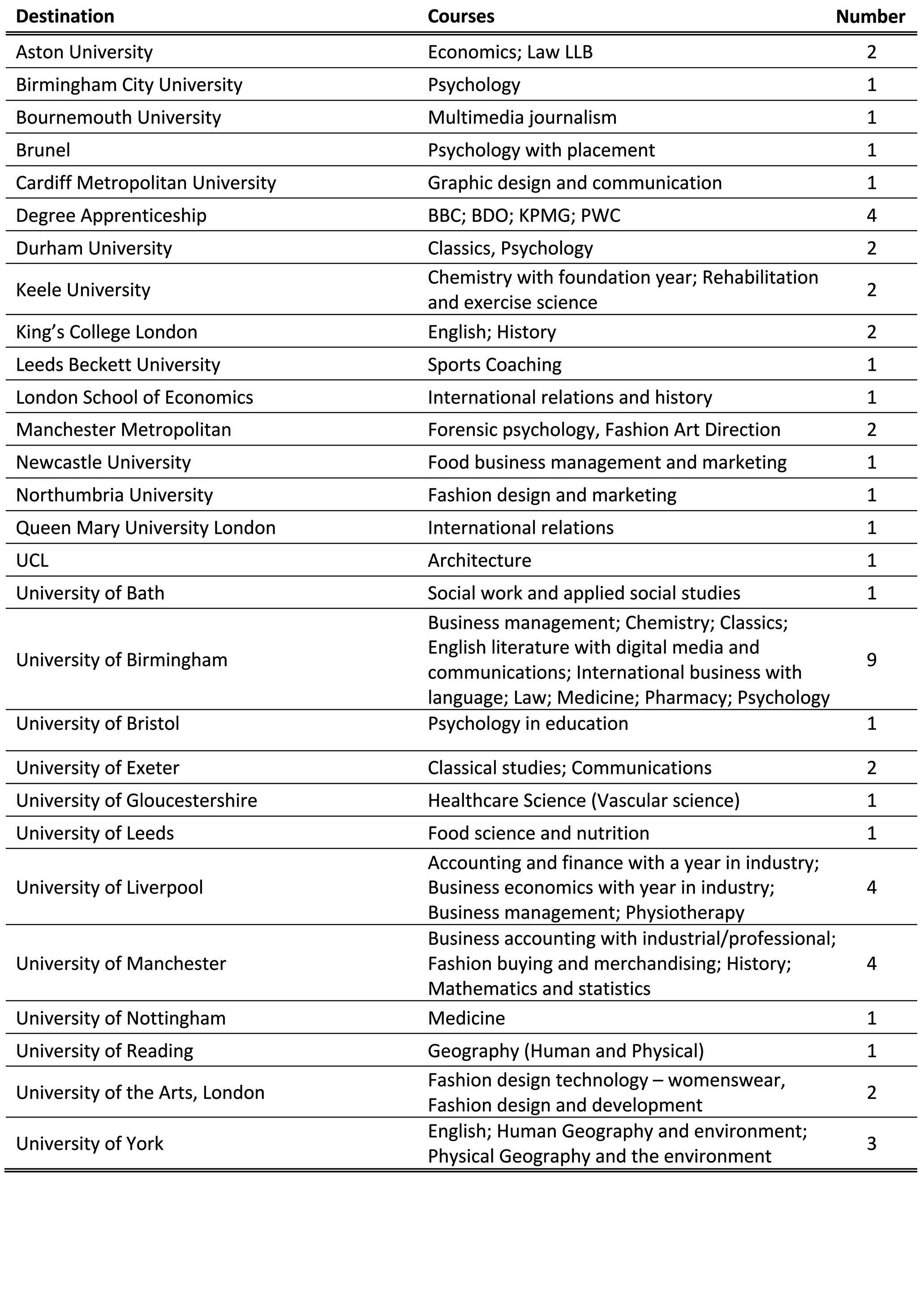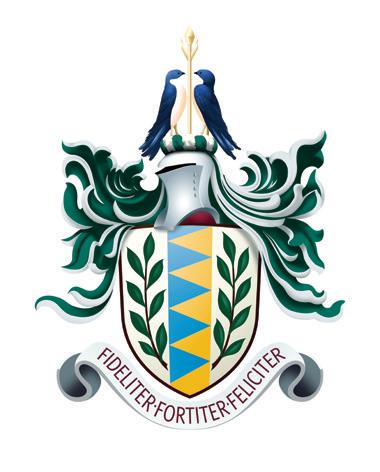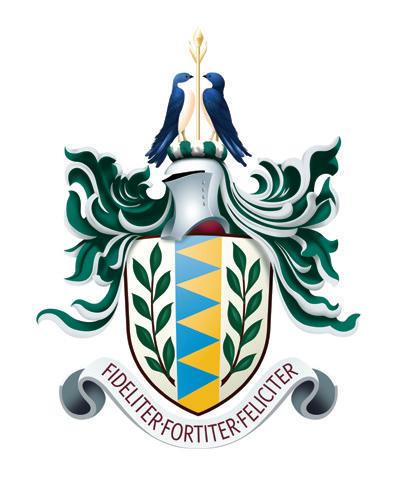

A-Level Subjects Prospectus
2025 - 2026
Welcome to EHS Sixth Form
Whether you are new to EHS or a current student here, our Sixth Form represents a stepping stone to an exciting, fulfilling future and offers you an abundance of opportunities; not only to work towards your longer-term academic goals, but also to contribute to school and community life, and learn valuable new skills. Most importantly, you have the chance to shape your own future. In your studies and beyond, the choices are yours.
As you would expect, the academic emphasis grows as you approach your A-Levels. But there is always a colourful mix of other activities, keeping life varied and helping you prepare for many aspects of your future, in higher education and the world of work. You’ll achieve a great deal in your studies, and just as much in your personal development. Students leave us ready to face any situation in life, with confidence, resilience and selfreliance.
Sixth Form Pastoral Team
Mrs Ehiogu - Head of Year 12
Mr Skilbeck - Assistant Head of Year 12
Mrs Parson - Head of Year 13
Mrs Smith - Assistant Head of Year 13
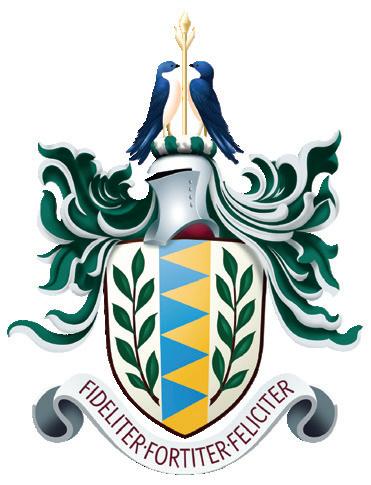
Subjects offered in the Sixth Form at Edgbaston High School
Subject
Subject
Enrichment Programme
At EHS we offer an extensive Enrichment Programme for all students. Every Wednesday afternoon students have the opportunity to participate in a wide selection of Enrichment Opportunities. Students can choose to gain a qualification or gain experience in one of many volunteering activities EHS has to offer. The programme offers students the opportunity to participate in a range of activities and experiences and to develop new skills, which are complementary to the curriculum at EHS.
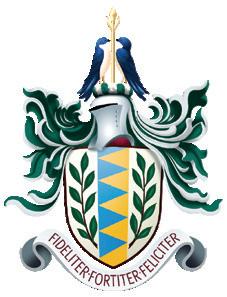
Sixth Form Leadership Opportunities at EHS
At Edgbaston High School we aim to give senior girls plenty of opportunity to take on roles of responsibility in both Years 12 and 13. We feel that as they enter the Sixth Form they are ready to act as role models to younger girls and hone important skills that will be needed for university and beyond such as teamwork, communication, time management and problem solving.
In Year 12, girls have the opportunity to become School Prefects. We have about 30 Prefects work together to create a rota and perform duties around the school such as assembly duty, break duty and Lunch duty . Some students will apply to be a Team Leader, this role is responsible for organising the school tours with the Admission Department, arranging Prefects to carry out the tours and ensuring that all Prefects know what they are expected to do each week. Students can also apply to become Prep Prefects. These Prefects work specifically in our Preparatory School, supporting young readers and helping at Preparatory Events. Year 12 girls can also become House Representative and are responsible for assisting the House Captains in the running of House events. Many Year 12 girls also become mentors to younger girls. They meet regularly with their mentees and work with them either on issues like organisation or help and support with their school work in a particular subject.
In Year 13 the possibilities are even greater. Girls can become Form Mentors with responsibility for a form in Years 7 – 9. Two Form Mentors are attached to each form and they spend time with their forms during registration and often at break or lunchtimes. They get to know their forms and have a very positive pastoral role, helping and advising the younger girls and acting as their “big sisters”.
Year 13 girls may also take on posts of responsibility in the House system. The school is divided up into five Houses and each House has a House Captain, a Deputy House Captain and a Sports Captain. These girls have a huge amount of responsibility when it comes to organising younger girls and their peers for House events such as the EHS Bake Off, the Christmas House Gala, the House Quiz and other whole school events such as Sports Day.

In Year 13 girls may also become Senior Prefects. Each Senior Prefect is given a specific role to perform; for example they may be responsible for raising money for charity and may have the responsibility for Green Issues and work alongside staff in our endeavours to make EHS a greener school. They also help in working towards the Schools Eco Award.
Of course the much coveted role is that of Head Girl. We have a vigorous selection process for our Head Girl and Deputy Head Girls which begins in February each year. Girls who wish to take on this role are required to write a letter to Mrs Macro, have an interview with a panel of senior staff and finally, and possibly most nervewracking of all, make a speech to the whole school in a special assembly. There is then a voting process. This year we are pleased to announce that our new Leadership Team for the school year 2024-25 consists of Head Girl Ruby Gayle and Deputy Head Girls Tyra Jambwa and Amy Sargeant.

Spotlight on the Leadership Team
Ruby Gayle Head Girl
I joined EHS in Year 7 and have so many fond memories of my time here that the fact that this is my last year here will take me a while to get my head around. EHS has been a crucial part of my development as an individual. It’s here that I discovered my love for languages, and all these years later I’m taking French, Spanish and Maths at A-level.
After GCSEs I had no idea which way I wanted to go with my studies, so not having any particular university course or career path in mind, I simply chose the things I enjoyed the most and the subjects that I had found good revision strategies for, which has now led me to the decision to continue with languages at university.
The step up to A-levels can be daunting, but the support given by all of the teachers helps to make the transition as smooth as possible. If there’s something you don’t understand, all you have to do is ask, and they will be happy to set aside some time to go through it with you, but it’s important that you make that first step towards getting back on track as this prepares you for the independence and proactivity required at university or in your chosen career.
In Year 13, the help provided during the application process has been amazing. I have gained so many valuable experiences during my time in sixth form such as helping to plan social events and run clubs, taking part in our EDGE talks, and having various responsibilities such as form mentor to younger years and senior prefect, all off which have given me lots to write about in my personal statement.
My advice to anyone starting sixth form would be to not be afraid to get out of your comfort zone and to do what you enjoy. EHS has enabled me to do both of these things, and I am gaining so many skills here to prepare me for life beyond school.
Tyra Jabawa Deputy Head Girl
The thought of me joining EHS 6 years ago in Year 7 seems completely unreal. For my A-Levels I am studying Psychology, Sociology and Business which I thoroughly enjoy due to the essay-based nature of them. Beyond EHS, I aspire to branch into a career in Accountancy. You may be thinking that due to my aspirations my options don’t correlate, however I did not want to pick subjects which I knew I would not enjoy, and I advise that you consider that thought as well. The difference between GCSEs and A-Levels is intense so it’s important that you are fond of your subject choices because then you will have the motivation to succeed within the subject.
You may be thinking that A-Levels are quite scary but I can assure that if you develop the independence revolving around your studies you will be fine! Reflecting on my time in Sixth Form, I have realised that alongside my studies, the freedom, responsibilities and opportunities that receive honestly equalise the pressure of A-Levels. Good luck with everything in the future!
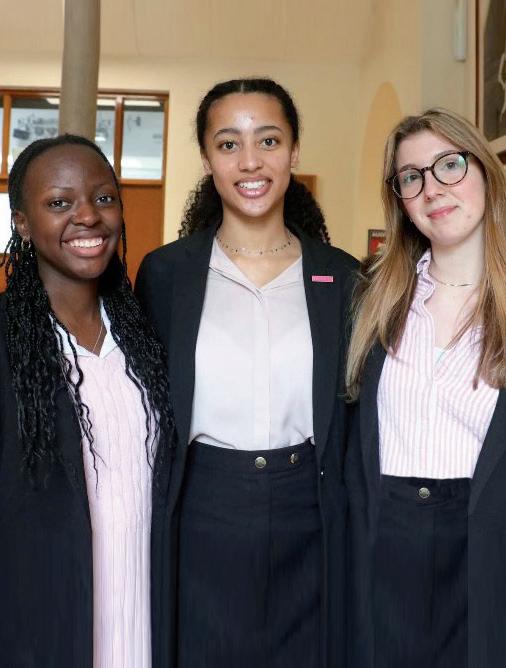

Amy Sargeant Deputy Head Girl
I joined EHS in 2021 and it was a daunting start as it was online and in the middle of a term. Nevertheless, I was welcomed into EHS warmly and despite not seeing people’s faces for a few weeks I continued to feel part of EHS life. Stepping in Sixth Form has been an incredible journey. I am studying English Literature, Business and Sociology.
In Year 12 I completed an EPQ. This allowed me to explore a topic I’m passionate about in great depth and develop my own personal skills. The independence it required not only developed my research and time management skills but also helped to prepare me for Year13 and beyond.
Beyond academics, I’ve have the opportunity to contribute to school life, being part of the Chamber Choir. The balance of having my academic subjects and a creative past time has been incredibly beneficial for me, allowing me to take part in an extra-curricular activity that has shaped a significant part of my school career.
Sixth form at EHS has equipped me with the skills for life after school, helping me with the academic studies, creative endeavour, leadership and public speaking. The support I’ve had from both teachers and peers has been invaluable as I prepare for my future beyond EHS.
Finally, my best advice for anyone entering Sixth form is to embrace every opportunity presented to you. Whether it’s super out of your conform zone or just right for you, I cant express enough how much I’ve loved delving into Sixth form life and found it incredibly beneficial to have the EHS support me the whole time.
Art & Design
Examination Board: AQA
Students wishing to be accepted onto this course should have already successfully completed a GCSE in Art and Design. Students will be following the general Art, Craft and Design course unless there are good reasons for them to focus on one particular area of study. In such cases, they may choose to concentrate on the area of Graphic Communication. The general Art, Craft and Design course offers a broad range of opportunities for students to explore their creativity in terms of painting, drawing, design for print, website design and video. Trips and visits offer students the chance to place their own work within a broader context and to learn from the experiences of others.
Students opting for either of these courses will typically spend Year 12 developing their practical skills and be entered for the A-level qualification in Year 13.
Qualification Content
Unit 1 Personal Investigation 60% of the mark. Coursework will consist of a range of work completed in the Graphic Communication/Fine Art areas to reflect each candidate’s chosen focus of study.
Unit 2 Externally-set assignment 40% of the mark. A range of questions/starting points is set by the board. An outcome is produced following a period of preparation in which ideas and images can be developed in sketchbooks. All work is marked internally and moderated by AQA.
Entry Requirements:
A Grade 7 at GCSE.


Biology
Examination Board: AQA
Biology has an ever-present impact on our daily lives through issues such as disease, DNA testing, genetic modification and ecological concerns. In studying A-level Biology you will gain an understanding of the science behind many of these topical issues. You will build on the understanding which has been gained at GCSE and develop this through discussion, presentation, practical work and data analysis.
The qualification is linear which means you will sit all of the exams at the end of your course.
The key topics which will be covered include:
Biological molecules - the structure, function and chemical testing of biological molecules such as carbohydrates, proteins, lipids and DNA.
Cells - All life on Earth exists as cells. These have basic features in common. You will find out about the amazing structure of cells and how substances can enter and leave them by diffusion, active transport and osmosis.
• Exchange with the environment - this section includes how oxygen is absorbed into the bloodstream and transported around the body in a range of animals including man, fish and insects.
• Genetic information - Differences between species reflect genetic differences. Differences between individuals within a species could be the result of genetic factors, of environmental factors, or a combination of both. You will learn about changes in the genetic code called mutations and how variation in a species can

be measured by looking at the differences in the base sequence of DNA.
• Energy transfers in and between organisms (A-level only). This section mainly focuses on the processes respiration and photosynthesis.
• Organisms’ response to changes in their environment (A-level only). This section includes aspects of the nervous system, muscle contraction and homeostasis.
• Genetics and populations (A-level only). You will learn about genetic crosses and sex linked inheritance.
• The control of gene expression (A-level only). This section will bring you right up- to- date with the most recent advances in Biology. You will learn about stem cells, epigenetics and how gene expression is controlled.
There are various practical investigations which you will undertake and may be examined in the final examinations. There are no ISAs and you will be awarded either Pass or Fail for your practical skills. At the end of the A-level course there will be three, 2-hour examinations.
Biology provides students with access to many biological careers and university courses including: medicine, dentistry, veterinary science, pharmacy, biochemistry, nursing, physiotherapy and forensic science. Biology can be combined with many non-scientific subjects to give useful breadth.
Entry Requirements:
Grade 9, 8 or 7 in Biology or Science (trilogy).

Business Studies
Examination Board: AQA
This course demonstrates the inter-related nature of business using business models, theories and techniques to support analysis of contemporary business issues and situations to provide a dynamic specification. The content is designed to engage students through topics and issues that are relevant in today’s society. Key contemporary developments such as digital technology, business ethics and globalisation are covered throughout the topics.
Students will develop the knowledge and skills needed to analyse data, think critically about issues and make informed decisions - all skills that are needed for further study and employment.
Aims of the specification
• develop an enthusiasm for studying business gain holistic understanding of business in a range of contexts
• develop a critical understanding of organisations and their ability to meet society’s needs and wants
understand that business behaviour can be studied from a range of perspectives
• generate enterprising and creative approaches to business opportunities, problems and issues
• be aware of the ethical dilemmas and responsibilities faced by organisations and individuals
acquire a range of relevant business and generic skills, including decision- making, problem solving, the challenging of assumptions and critical analysis
• apply numerical skills in a range of business contexts
Subject content
1. What is business?
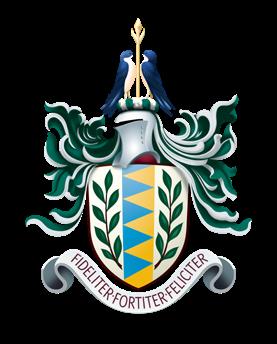
2. Managers, leadership and decision making.
3. Decision making to improve marketing performance.
4. Decision making to improve operational performance.
5. Decision making to improve financial performance.
6. Decision making to improve human resource performance.
7. Analysing the strategic position of a business (Year 2 only).
8. Choosing strategic direction (Year 2 only).
9. Strategic methods: how to pursue strategies (Year 2 only).
10. Managing strategic change (Year 2 only).
Assessment
Year 1
Papers 1 and 2: Content 1. - 6.
Two written exams - each lasts 1 hour 30 minutes. Each counts for 50% of the marks.
Year 2
Papers 1, 2 and 3. All content 1. - 10. Three written exams - each lasts 2 hours. Each counts for 33.3% of the marks.
Entry Requirements:
Students need a Grade 7 in both GCSE Mathematics and English Language.

Chemistry
Examination Board: AQA
Chemistry is taught as a mixture of practical and theory lessons combined to give a sound understanding of the principles and concepts involved. The topics are divided up into three main areas: Organic, Inorganic and Physical Chemistry.
Physical Chemistry: Atomic structure, Amount of substance, Bonding, Energetics, Kinetics, Chemical equilibria, Le Chatelier’s principle and Kc, Oxidation, Reduction and redox equations, Thermodynamics, Rate equations, Equilibrium constant Kp for homogeneous systems, Acids and bases.
Inorganic Chemistry: Periodicity, Group 2: the alkaline earth metals, Group 7: the halogens.
Properties of Period 3 elements and their oxides, Transition metals, Reactions of ions in solution.
Organic Chemistry: Introduction to organic chemistry, Alkanes, Haloalkanes, Alkenes, Alcohols, Organic analysis, Optical isomerism, Aldehydes and ketones, Carboxylic acids and derivatives, Aromatic chemistry, Amines, Polymers, Amino acids, proteins and DNA, Organic synthesis, NMR spectroscopy, Chromatography.
Assessments
Students are assessed at the end of the two year course.

Paper 1: 2 hours, 105 marks of short and long answer questions, 35% of A-level
Physical Chemistry, Inorganic Chemistry and practical skills.
Paper 2: 2 hours, 105 marks of short and long answer questions, 35% of A-level
Physical Chemistry, Organic Chemistry and Practical skills.
Paper 3: 2 hours, 90 marks (40 marks on practical skills and data analysis, 20 marks of questions on testing across the specification and 30 marks of multiple choice questions). Any content and practical skills.
A-level grades will be based only on marks from written examinations. A separate endorsement of practical skills will be taken alongside the A-level. This will be assessed by teachers and will be based on direct observation of students’ competency in a range of skills assessed in 12 required practicals.
Students will have the opportunity to attend a variety of academic lectures and trips to local universities where access to material that will enhance the course will be available.
Entry Requirements:
Candidates wishing to study Chemistry in Year 12 must have Grade 7 GCSEs in both Chemistry and Mathematics.

Classical Civilisation
Examination Board: OCR
Most students come to study Classical Civilisation as a brand new subject, making it attractive to aspirational students. It also provides new opportunities to study diverse topics within Arts and Humanities.
For students wishing to progress on to higher education, Classics qualifications are highly esteemed. Students not only acquire specific knowledge, but also important transferable skills such as analysing sources and developing independent, critical and evaluative approaches. They learn to formulate and support an argument and gain a valuable understanding of cultures very different to their own. From the proven ability to write a well-structured extended response to the acknowledgement of the views of others and a cultural sensitivity to these, Classics puts students in an excellent position to seek employment opportunities.
A-level
Classical Civilisation (three examined modules)
The World of the Hero (40%, 2 hour 20 minutes)
Students study Homer’s ‘Iliad’ alongside Virgil’s ‘Aeneid’ exploring concepts of heroism and the context in which the epic poems were composed. The unit provides students with an opportunity to appreciate the lasting legacy of two epics that are regarded as the beginning of the Western literary canon.
Greek Theatre (30%, 1 hour 45 minutes)
Students explore the origins of theatre in the study of two Greek tragedies (Sophocles’ ‘Oedipus Tryannus’ and Euripides’ ‘Bacchae’) alongside one Greek comedy (Aristophanes’ ‘Frogs’). The drama produced in the ancient Greek theatre

forms some of the most powerful literature of the ancient world, and has a profound and widereaching influence on modern culture.
Democracy and the Athenians (30%, 1 hour 45 minutes)
The aim of this component is to examine the concept of Democracy; what this meant to the Athenians, and its positive and negative aspects. By reading a variety of texts in translation, students study how democracy permeated Athenian identity, how it was celebrated and idealised, but also how it was criticised. The concepts of ‘popular’ leaders who mislead the people, or give them what they want rather than what they need, and a voting public who may not be fully informed on the issues, will resonate with today’s learners and make this study of one of the West’s foundational political ideas engaging and relevant.
Students study Classical Civilisation for 2 years and all examinations are in the summer term.
Students are encouraged to extend their understanding of Classics beyond the demands of the A-level syllabus by attending university lectures and workshops on relevant topics. Girls are also encouraged to enter Sixth Form essay competitions run by Oxbridge Colleges and the Gladstone Memorial Essay.
Entry Requirements:
This is an intellectually demanding course which requires a high level of analytical thought and literacy. Therefore, we expect students to have gained a minimum of a Grade 7 in English Language and / or Literature. If students have studied Classical Civilisation GCSE a minimum of Grade 7 is required.

Classical Greek
Examination Board: OCR
Classical Greek is a highly-prized academic subject. The course builds on the knowledge, skills and understanding established at GCSE. The Classical Greek specification teaches the language skills which enable learners to read both prose and verse texts in the original language. The course aims to inspire, motivate and challenge by encouraging students to read widely and to develop the critical analysis skills with which to engage sensitively in and evaluate an ancient language.
Students can choose to study Classical Greek for 1 or 2 years. All examinations take place in the Summer Term.
Year 1 Examination (two modules)
Classical Greek Language (1 hour 30 minutes)
Translation from Classical Greek into English, with the option of translating English into Classical Greek OR answering comprehension questions on an unseen passage. There is a vocabulary list which will be learned over the course of the year.
Classical Greek Literature (1 hour 30 minutes)
A study of 400 lines of prescribed verse and prose authors. For assessment in 2024-2025 these will be either Herodotus or Plato (Prose) and Homer or Euripides (Verse).
Year 2 Examination (four modules)
Unseen Translation (1 hour 45 minutes)
Translation of one passage of unseen prose and

one passage of unseen verse from Classical Greek into English.
Prose Composition or Comprehension (1 hour 15 minutes)
Either a short translation, comprehension and grammar questions OR translate a passage of at least 100 words from English into Classical Greek.
Prose Literature (2 hours)
Comprehension, translation and analysis questions on two set texts and an essay on one set text, drawing upon additional reading in English (Herodotus, Plato or Plutarch).
Verse Literature (2 hours)
Comprehension, translation and analysis questions on two set texts and an essay on one set text, drawing upon additional reading in English (Homer, Euripides or Aristophanes).
Teaching is in small tutorial groups, which include both group and individual work as well as tutor led activities. We invite students to attend academic lectures and university study days to widen their understanding of the Classical world.
Entry Requirements:
A minimum of Grade 7 in GCSE Classical Greek and a high grade in English Literature.

Core Mathematics
Examination Board: Edexcel Level 3 Core Mathematics
This is a one-year course leading to a Level 3 qualification (equivalent to an AS-level).
The purposes of this qualification are to: Consolidate and build on students’ mathematical understanding, and develop further mathematical understanding and skills in the application of mathematics to authentic problems.
• Build a broader base of mathematical understanding and skills in order to support the mathematical content in other Level 3 qualifications, for example GCE A-level Biology, Business Studies, Economics, Geography, Psychology, Business and IT.
• Provide evidence of students’ achievements against demanding and fulfilling content, to give them the confidence that the mathematical skills, knowledge and understanding they will acquire during the course of their study are as good as that of the highest-performing jurisdictions in the world.
• Prepare students for the range of varied contexts that they are likely to encounter in vocational and academic study, future employment and life.
Content
The content areas covered in this qualification (across both papers) are:
• Applications of statistics
• Probability
• Linear programming
• Sequences and growth
Assessment
Two written papers each 1 hour 40 mins:
• Paper 1 Comprehension contributing 40%
• Paper 2 Application contributing 60%

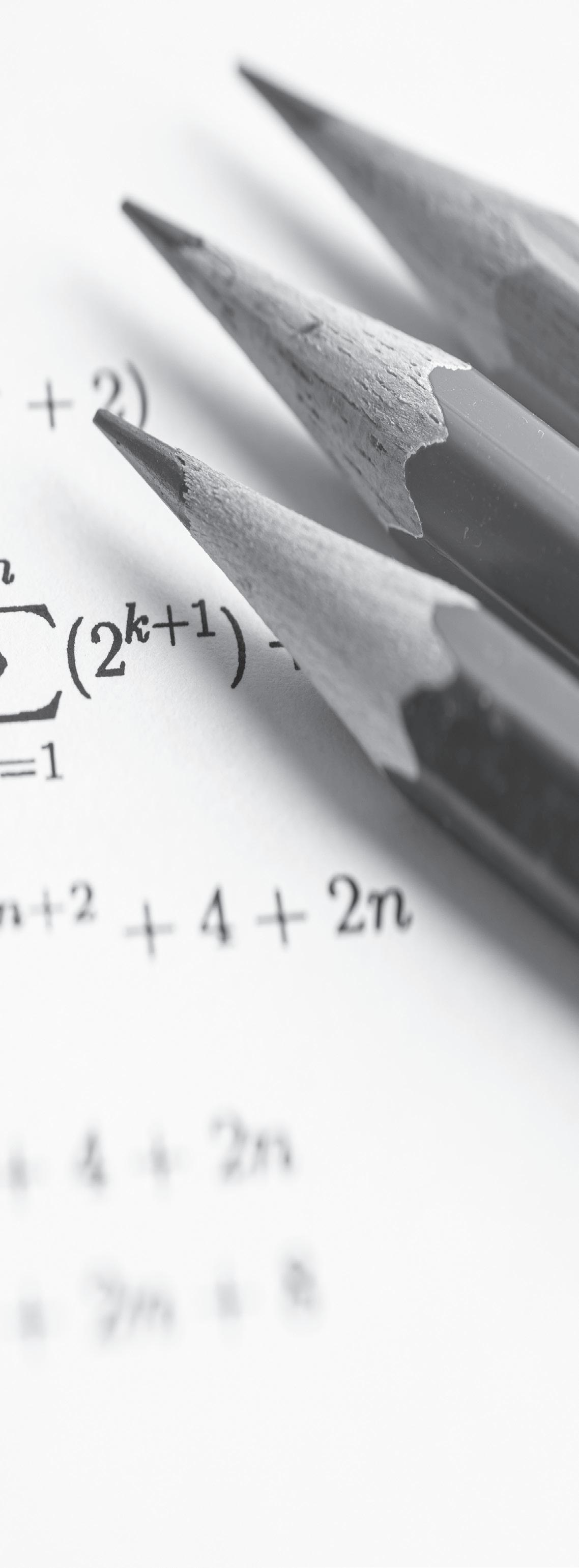
Dance
Examination Board: AQA
A-level Dance is a dynamic qualification which encourages students to develop their creative and intellectual capacity. This specification reflects both current and historical dance practices and inspires a lifelong passion and appreciation for dance.
‘It takes an athlete to dance, but an artist to be a dancer’ – Shanna LeFleur
Why choose A Level Dance?
A Level Dance gives you the opportunity to explore your own creative voice through choreography and performance. The course allows you to explore a range of different dance styles, giving you the opportunity to perform in a style of your choice for group choreography. Along with these practical elements, you will also critically engage and appreciate the work of others in a theoretical format.
You will also develop transferable skills such as teamwork, communication and problem solvingthese are essential skills that are attractive to employers, universities, and higher education courses. This will help you stand out in any career pathway.
Alongside the aspects of the course, there is also opportunities to participate in dance workshops with professional dance companies and see professional dance work live.
This course will stretch you as a dancer, performer, and artist, giving you an in-depth knowledge of the wonderful world of dance.
This two-unit specification requires students to:
Component 1 -
Performance and Choreography
What's assessed
Performance in a quartet
• Group choreography
Solo performance linked to a specified practitioner within an area of study.

Component 2 - Critical Engagement
What's assessed
Knowledge, understanding and critical appreciation of two set works.
One compulsory set work within the compulsory area of study
• One optional set work within the corresponding area of study, from a choice of four.
The practical elements of the course amount to 50% of the full qualification.
The course is taught across two years, and you will have roughly 3 ½ hours of Dance lessons a week.
Entry Requirements
• GCSE Dance or English at grade 7 and above.
• GCSE Dance is desirable but not essential. Students that haven’t taken GCSE Dance will need the demonstrate their practical ability prior to being accepted on the course.
Candidates must have an interest in the broad spectrum of dance as well as participation in a club outside school.
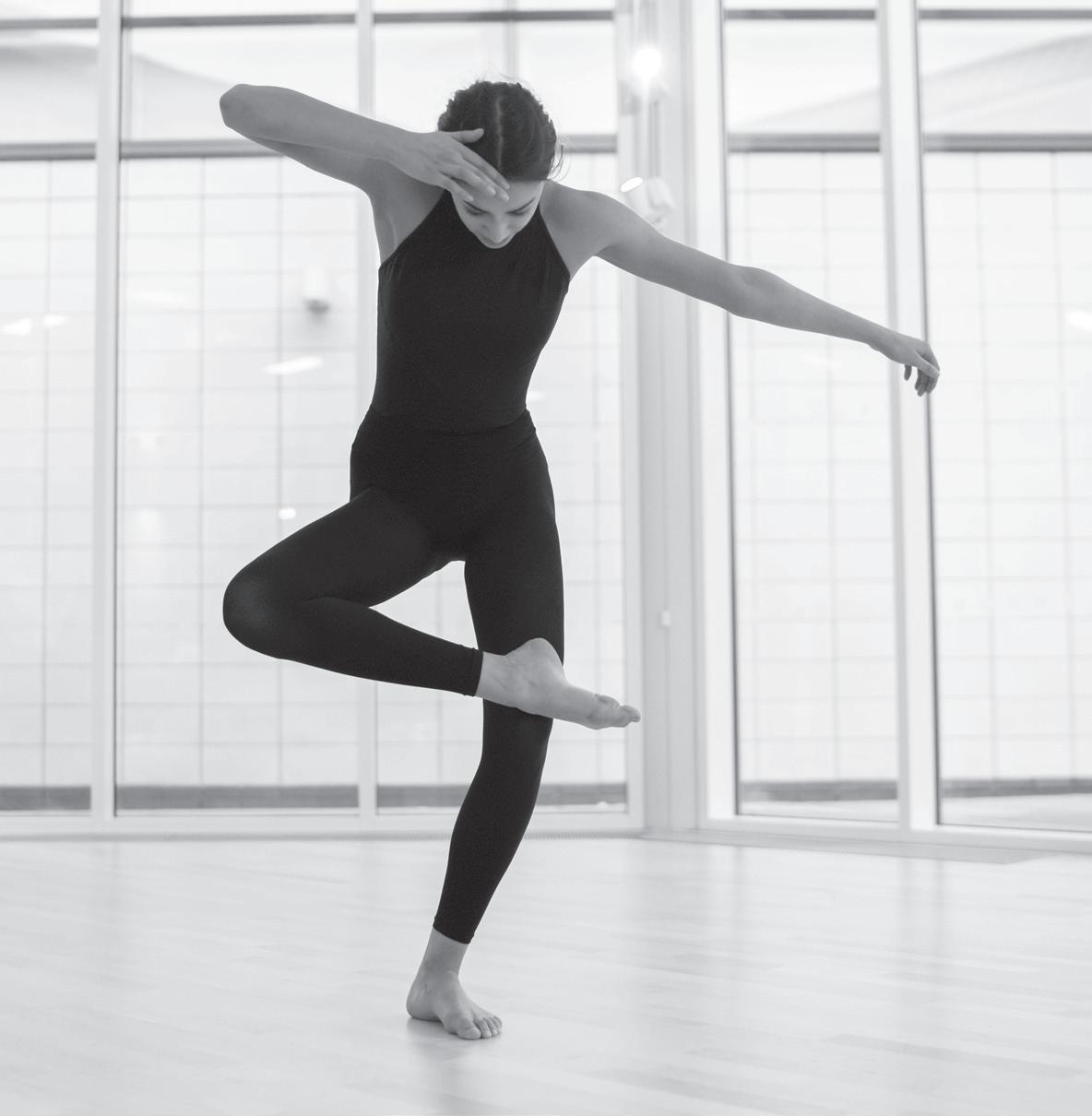
Design & Technology: Fashion & Textiles
Examination Board: AQA
This creative and thought-provoking qualification has been designed to encourage students to take a broad view of design and technology related to all areas of Fashion and Textiles. It enables them to use practical skills together with theoretical knowledge to have the confidence to succeed in a number of careers, especially in the creative industries.
Students will develop their abilities to design and make products and to appreciate the complex relationships between design, materials, manufacturing and marketing. Fashion and Textiles A-level provides wide opportunities for study, ranging from fashion and aesthetics to industrial uses of textiles and from creative and individual pieces of work to aspects of manufacturing and industrial commercial practice. Students will also use maths and science skills which will be employed in the collaborative projects with professionals from industry.
The course has been designed to take students on to a higher level of Fashion and Textiles or product design study prior to a university course. Equally, it would interest students who have a flair for the subject but who simply want to study it as part of a planned route through Sixth Form studies.

A-level Design and Technology: Fashion and Textiles
Assessment
Core technical principles
-Written exam: 2.5 hours
- 30% of A-level
Core designing and making principles
(product analysis and commercial manufacture)
- Written exam: 1.5 hours
- 20% of A-level

Non-exam assessment (NEA)
-Design and make task
-45 hours
- 50% of A-level
Entry Requirements
GCSE D&T: Textiles at Grade 6 or above and GCSE Maths 4 or above, but candidates who have not studied D&T: Textiles before will be considered. This course combines well with many other subjects, including Art, Business Studies, Geography, Mathematics and Sciences.
Drama & Theatre Studies
Examination Board: AQA
The course emphasis is on drama and theatre studies as a practical, intellectual, academic as well as an artistic subject. It includes the practical exploration of plays, written coursework, practical performance work and an externally examined written paper.
Component One: One Devising (Year 1)
The student devises an original piece of drama for presentation to an audience. This unit is internally assessed and externally moderated. It is worth 40% of the qualification. Students are required to:
• Devise an original piece of theatre. Use one key extract of a text and a theatrical practitioner as a starting point.
• Perform a staging of the devised material.
Component Two: Text in Performance (Year 2)
Students study two play texts that lead to the performance of an extract from each text. One extract is performed as a group and the second as either a monologue or duologue. It is worth 20% of the qualification. Both performances are externally assessed by a visiting examiner.
Component Three: Theatre Makers in Practice
(Years 1 and 2)
This component consists of a written examination

that is divided into three sections and is worth 40% of the qualification.
Section A: Students answer one question, evaluating a live theatre performance they have seen.
Section B: Students answer two questions based on an unseen extract from a set list of texts. Students answer the question in relation as to how they would theatrically stage the given extract.
Section C: Students answer one question based on an unseen named section from another set text that is different from that studied in Section B. Students are required to outline how they would stage the unseen extract in light of a recognised theatrical practitioner.
Entry Requirements
Students must have a genuine interest in the theatre. All students must also be prepared to perform, even though their major interest may be in design. Working with others in a group is an essential aspect of the course. Students do not necessarily need to have studied GCSE Drama; their enthusiasm for the subject may have stemmed from having experience of extracurricular Drama at school or as a member of a Youth Theatre group and/or a developed interest in how plays are studied in English.

Economics
Examination Board: AQA
Our approach to Economics is to apply economic theory to support analysis of current economic problems and issues, and encourage students to appreciate the interrelationships between microeconomics and macroeconomics.
Aims of the specification
To appreciate the contribution of economics to the understanding of the wider economic and social environment.
• To develop an understanding of a range of concepts and an ability to use those concepts in a variety of different contexts.
• To use an enquiring, critical and thoughtful approach to the study of economics and develop an ability to think as an economist.
To understand that economic behaviour can be studied from a range of perspectives.
To develop analytical and quantitative skills, together with qualities and attitudes which will equip them for the challenges, opportunities and responsibilities of adult and working life.
• Students will be expected to acquire competence in quantitative skills that are relevant to the subject content and be familiar with the various types of statistical and other data which are commonly used by economists.
A-level Economics content
Over this two year course, you will study

areas and topics drawn from both micro and macroeconomics.
Microeconomics: the economic problem and economic methodology; individual economic decision making; price determination in a competitive market; production, costs and revenue; perfect competition, imperfectly competitive markets and monopoly; the labour market; the distribution of income and wealth: poverty and inequality; the market mechanism, market failure and government intervention in markets.
Macroeconomics: the measurement of macroeconomic performance; how the macro economy works; economic performance; financial markets and monetary policy; fiscal policy and supply-side policies; the international economy.
Assessments
At the end of the two year course, you will sit three two hour written exams and each exam will be worth one third of the overall mark. Paper one will cover markets and market failure, paper two will cover the national and international economy and paper three will draw on material from the whole course. The papers will feature a range of question styles including multiple choice questions; short answer questions; essay questions; data response questions; case studies.
Entry Requirements
Students need a Grade 7 in both GCSE Mathematics and English Language.

English Language & Literature
Examination Board: OCR
A-level English Language & Literature will enable students to:
Apply concepts and methods from integrated linguistic and literary study as appropriate, using associated terminology and coherent written expression.
Analyse ways in which meanings are shaped in texts.
• Demonstrate understanding of the significance and influence of the contexts in which texts are produced and received.
• Explore connections across texts, informed by linguistic and literary concepts and methods. Demonstrate expertise and creativity in the use of English to communicate in different ways.
Component 1 - Exploring non-fiction and spoken texts (1 hour exam, worth 16%)
Exploring non-fiction and spoken texts (Component 01) focuses on an anthology of 20 spoken and written texts from different time periods, types of text and contexts. Texts in the anthology will be refreshed after three years and centres will be notified in advance. A balance of spoken and written, historical and contemporary texts will be maintained.
Component 2 - The language of poetry and plays (2 hour exam, worth 32%)
Study of one substantial poetry text from a list of six (15 poems prescribed for each text).
Study of one drama text from a choice of six.
Component 3 - Reading as a writer, writing as a reader (2 hour exam, worth 32%)
Reading as a writer - focuses on the nature of narrative in one prose fiction text from a choice of six.

Writing as a reader - requires the learners to draw upon their understanding of how narratives work as the basis for their own original writing in the genre of narrative, together with a commentary.
Component 4 - Independent study: analysing and producing texts (coursework, worth 20%) - two texts
At least one of the two texts must be chosen from a given list, and at least one text must have been published post-2000.
Extracurricular - The English Department offers a real-world writing enrichment that complements the creative written elements of the A-level course. There will also be a number of competitions throughout the school year for writing in different forms.
The Sixth Form Literary society run half-termly book clubs and enjoy a host of activities run by the English Department including theatre trips to London and Stratford. From 2019 there will be a designated Sixth Form English scholar, who will be instrumental in keeping such ventures fresh and relevant. There is also a successful Sixth Form Debating club, currently run by an English teacher.
Entry Requirements
You should enjoy the subject and be prepared to read outside the specification. You should look forward to exploring new literary texts, having a genuine interest in how language and society interact and shape one another. We would expect you to have a Grade 6 or above at GCSE English Language and English Literature.
English Literature
Examination Board: OCR
A-level English Literature will enable students to develop their interest and enjoyment of literature and literary studies as they:
• Read widely and independently.
• Engage creatively with a substantial body of texts and different ways of responding to them.
• Develop and effectively apply their knowledge of literary analysis and evaluation in writing. Explore the contexts of the texts they are reading and others’ interpretations.
A-level
There are two examined components:
Component 1: Shakespeare, Drama, and Poetry pre-1900; Students study one set Shakespeare text and one set pre-1900 drama text and one set pre-1900 poetry text.
2 hours and 30 minute examination; 60 marks, 40% of the two A-level Qualification.
Component 2: Comparative and Contextual study – will consist of a close reading exercise and a comparative essay on two texts chosen from lists set by the examination board. 40% of total A-level.
Component 3: Non-exam assessment (coursework):
Candidates have to study three texts from across the genres of poetry/drama and prose.

Task one: A critical analysis or a recreative piece.
Task two: A comparative essay focusing on connections between two texts.
Non-examined piece of coursework; 40 marks, 20% of A-level.
Extracurricular
The Sixth Form Literary society run half-termly book clubs and enjoy a host of activities run by the English Department including theatre trips to London and Stratford. Past trips have included King Lear, Much Ado About Nothing, Death of a Salesman and Frankenstein. We also ensure Sixth Form students are booked onto externally run study days to complement the set examination texts.
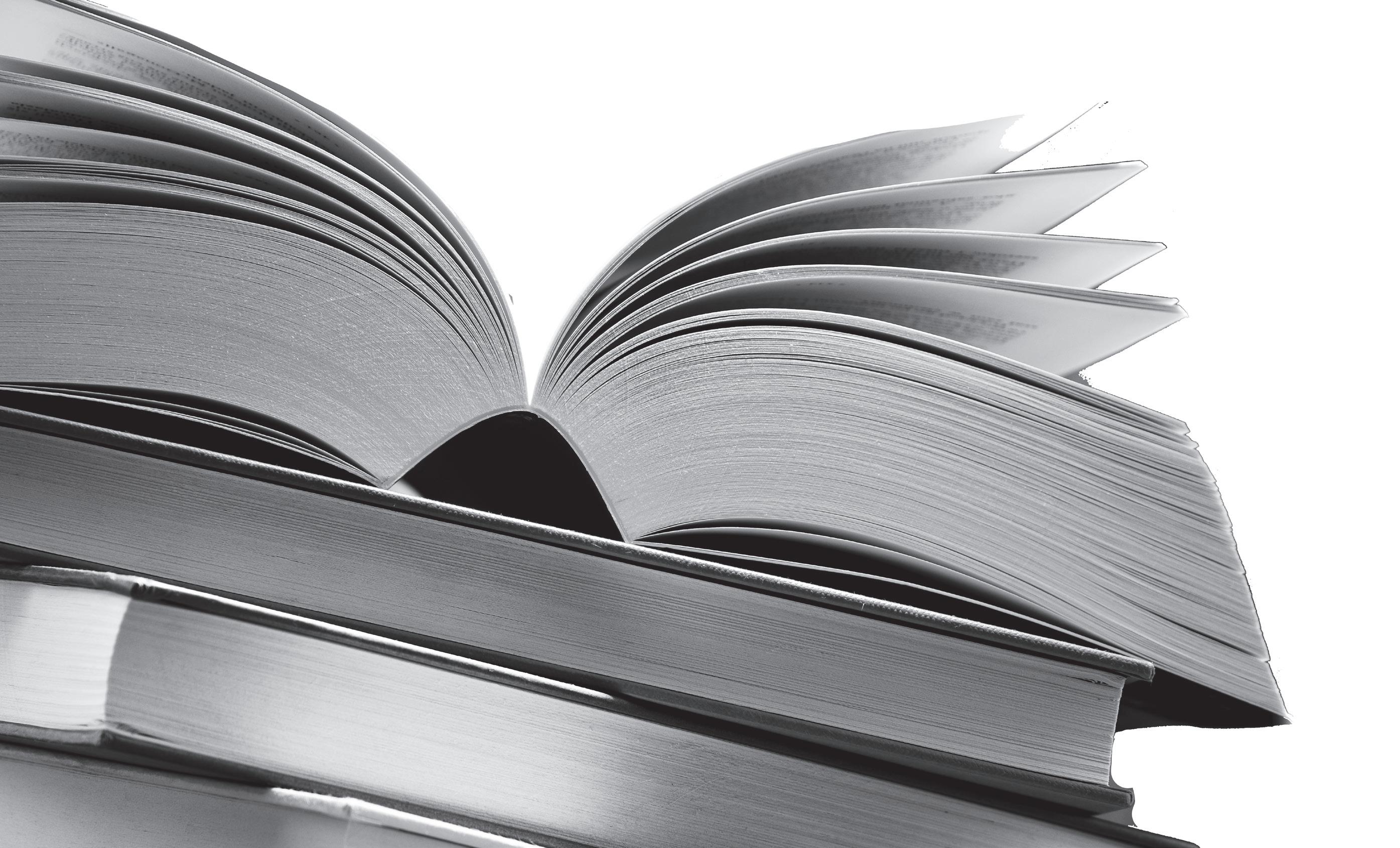
Entry Requirements
Naturally you should enjoy the subject and be prepared to read outside the specification. If you have a genuine interest in plays, novels and poetry and how writers use language, you will be welcome. We expect you to have a Grade 7 at GCSE.
Extended Project
Examination Board: OCR
The Extended Project Qualification (EPQ) provides an opportunity for students to extend their abilities beyond the A level syllabus by undertaking a project on a subject they are studying, or in an area of personal interest.
The EPQ is available as an optional additional qualification in both Years 12 and 13. With the support of a staff supervisor, students select a project title, plan, manage, realise and review their project. The final outcome of the project can be a 5,000 word dissertation or alternatively a design, performance, report, or artefact plus 1,000 word written component. All students are also required to provide a portfolio of evidence to support their submission and to give a short presentation about their project to an invited audience of staff and peers.
Each student is allocated a staff supervisor with whom they meet on a fortnightly basis to discuss progress and receive guidance. Students also receive a number of hours of group teaching in which they are given guidance on a range of topics including planning and time management and research and referencing skills.
Assessment
The EPQ is equivalent to half an A level and is graded from A* to E; it is worth up to 28 UCAS points. The four key areas assessed are:-
• Managing a project
Using resources
Developing and realising a project
• Reviewing a project
Universities value the transferable skills gained by students undertaking the EPQ, in particular the independent learning skills which are developed and some universities will lower the offers they make to students who achieve at least a Grade B in their Extended Project.

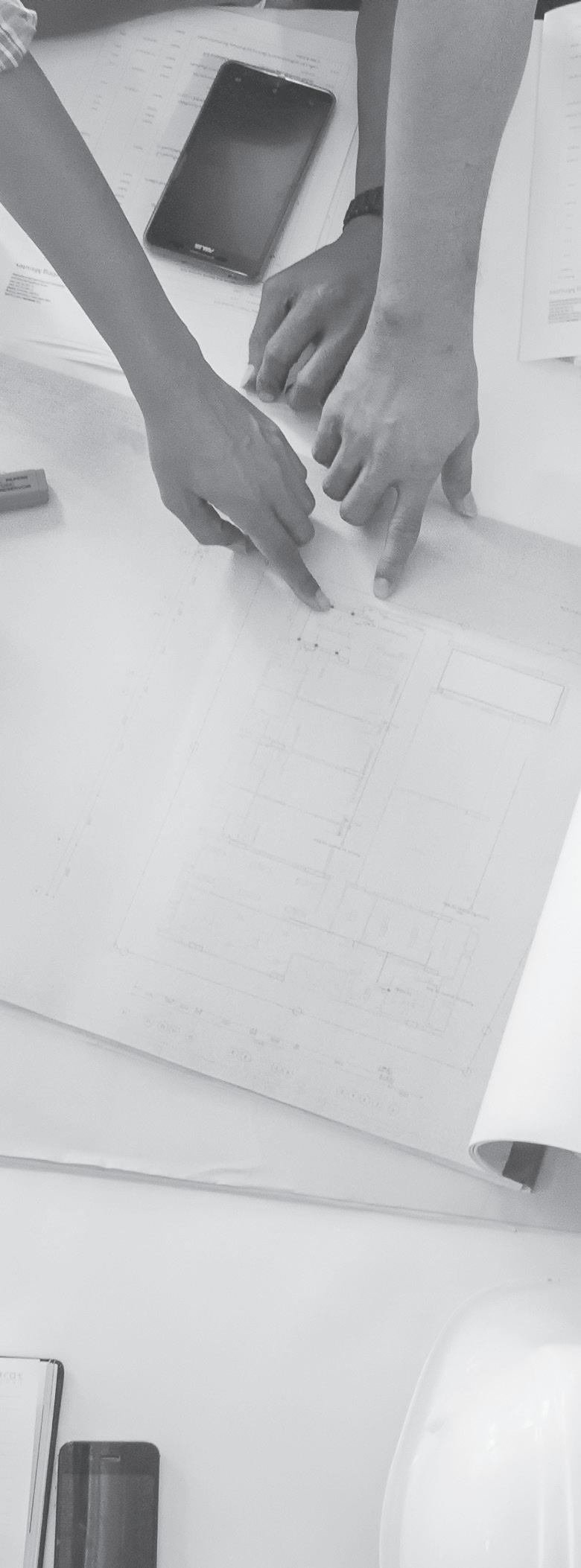
Geography
Examination Board: Edexcel
Geography is an extremely versatile subject; it can be classed as both a Science and an Art, making it very favourably looked upon by universities and employers alike. The Geography course equips students with a wide range of skills both analytical and discursive. Geographers are able to undertake fieldwork, analyse and evaluate data whilst also understanding both the human and physical world around them.
Fieldwork is an invaluable aspect of A-level Geography and students must complete four days of fieldwork; these four days will include both Human and Physical Geography. Past local destinations have included Birmingham and Carding Mill Valley, whilst there have been opportunities to venture further afield and undertake fieldwork in Morocco, Spain and Iceland.
The syllabus
In Year 1, students study a balance of Human and Physical Geography. In Human Geography they will study the complex process of globalisation and the influence which this has on economies and cultures worldwide, before considering how places are shaped through regeneration. Physical Geography will focus on Tectonic Process and Hazards, building upon knowledge from GCSE and extending this to see real world implications. Following on from this topic, girl will consider

landscape systems, processes and change; they will focus on coastal landscapes.
Year 2 contains more of a focus on current affairs and ensures that students have a true awareness of what it means to be a global citizen. Students consider the dynamics of power and implications of this, before investigating global development and connections in Human Geography. Physical Geography is studied through water and carbon cycles, before considering both water and energy security worldwide.
Examinations will include short, factual answers which will rely on the use of key terms and data, alongside essay questions which by nature will be more analytical and evaluative.
Entry requirements
It is possible for students to undertake A-level Geography without having studied the topic for GCSE, however the courses are designed to complement one another and any student who has not completed GCSE Geography will be expected to undertake extra reading around the topic. Geography is an intellectually demanding course which relies on both literacy and numeracy skills in order to complete essays and analyse data. Therefore, we would expect students who have undertaken GCSE Geography to have achieved a Grade 6 or above, and all students to ideally have achieved Grade 6 in English and Mathematics.

History
Examination Board: OCR
Studying History equips you with knowledge, understanding, and skills which will prove invaluable in later life. It develops your understanding of the contemporary world and the forces which have shaped the society in which we live. Students choose A-level History because they possess a genuine interest in the past and the desire to analyse it in great detail. We hope that you will enjoy the cut and thrust of historical debate, challenging accepted views and developing a real expertise in your specialist subject. Through the pursuit of History you will learn to articulate your views effectively, construct complex analytical arguments and take responsibility for the management of your own learning.
This programme comprises four components:
1. British period study and enquiry - England 14451509: Lancastrians, Yorkists and Henry VII
2. Non-British period study - The Cold War in Europe, 1941-1995
3. Thematic study and historical interpretationsCivil Rights in the USA, 1865-1992
4. Topic-based coursework essay. This is an independently researched 4,000 word investigation of a historical issue related to your Unit 1 or Unit 2 study.
Students are encouraged to extend their understanding of History beyond the demands of the A-level syllabus by attending university lectures and workshops on relevant topics. Girls are also encouraged to enter Sixth Form essay competitions run by Oxbridge Colleges.
Entry requirements
For students looking to study History at A-level, it is strongly recommended they will have studied History at GCSE and have achieved a Grade 7 or above, as well as achieved a Grade 7 in GCSE English. Prospective students must have a strong understanding of contextual knowledge of 20th century World History.


Latin
Examination Board: OCR
Latin is a highly-prized academic subject. The course builds on the knowledge, skills and understanding established at GCSE. The Latin specification teaches the language skills which enable learners to read both prose and verse texts in the original language. The course aims to inspire, motivate and challenge by encouraging students to read widely and to develop the critical analysis skills with which to engage sensitively in and evaluate an ancient language. Students can choose to study Latin for 1 or 2 years. All examinations take place in the Summer term.
Year 1 Examination (two modules)
Latin Language (1 hour 30 minutes)
Translation from Latin into English, with the option of translating English into Latin OR answering comprehension questions on an unseen passage. There is a vocabulary list which will be learned over the course of the year.
Latin Literature (1 hour 30 minutes)
A study of 400 lines of prescribed verse and prose authors. For assessment in 2024-2025 these will be Cicero (Prose) and Virgil (Verse).
Year 2 Examination (four modules)
Unseen Translation (1 hour 45 minutes)
Translation of one passage of unseen prose and one passage of unseen verse from Latin into English.

Prose Composition or Comprehension (1 hour 15 minutes)
Either a short translation, comprehension and grammar questions OR translate a passage of at least 100 word from English into Latin.
Prose Literature (2 hours)
Comprehension, translation and analysis questions on two set texts and an essay on one set text, drawing upon additional reading in English (Cicero, Tacitus or Livy).
Verse Literature (2 hours)
Comprehension, translation and analysis questions on two set texts and an essay on one set text, drawing upon additional reading in English (Virgil, Juvenal or Ovid).
Teaching is in small tutorial groups, which include both group and individual work as well as tutor led activities. We invite students to attend academic lectures and university study days to widen their understanding of the Classical world.
Entry Requirements
A Grade 7 minimum in GCSE Latin and a high grade in English Literature.

Mathematics
Examination Board: AQA
In both years of the course, the Pure Maths element studies the fundamental theories and methods of mathematics, building on familiar GCSE topics such as quadratics and trigonometry and leading to more advanced topics such as calculus. The Statistics and Mechanics elements study the applications of mathematics to real life situations.
In addition to its values in its own right, Mathematics as an A-level subject offers, firstly, the necessary entrance requirements for degrees in Mathematics, Physics, Engineering and Computer related subjects. Secondly, it offers support to a range of subjects which involve the use of mathematics: Sciences, Geography, Business Studies, and Psychology. Thirdly, it can provide a complimentary option for those studying Arts or Humanities subjects.
A-level Mathematics - linear course
The core content studied over two years includes topics from pure maths, statistics and mechanics. Students are assessed on their skills in Mathematical argument, language and proof, Mathematical problem solving and Mathematical modelling. The course is assessed by three two hour examinations with a mix of question styles, from short, single-mark questions to multi-step problems, where each examination is equally weighted with approximately two thirds topics from pure maths, one third statistics and one third mechanics.
AS-level Mathematics
The core content studied forms the first year of the A level course including topics from pure maths, statistics and mechanics. The course is assessed by two one and a half hour examinations with a mix of question styles, from short, single-mark questions to multi-step problems. Where each examination

is equally weighted with approximately two thirds topics from core maths, one third statistics and one third mechanics.
Further Mathematics A level - linear course
This course is studied over two years and includes new topics from further pure maths such as complex numbers, matrices and more advanced algebra. There are two applied modules, chosen from statistics, mechanics or discrete maths. Students are assessed on their skills in Mathematical argument, language and proof, Mathematical problem solving and Mathematical modelling.
Assessment is by three two hour examinations with a mix of question styles, from short, single-mark questions to multi-step problems. The examinations are equally weighted with approximately two thirds topics from further pure maths, one third applied modules. Further Mathematics is only available to students who are also studying A-level Mathematics.
AS-level Further Mathematics
Core content studied over a year includes topics from further pure maths, and two applied modules from statistics, mechanics and discrete maths. Assessment is two one and a half hour examinations with a mix of question styles, from short, single-mark questions to multi-step problems. The examinations are equally weighted with approximately two thirds topics from core maths, one third applied.
Entry Requirements
Students need to have achieved a GCSE Grade 7 or above in Mathematics to study A level Mathematics. A GCSE Grade 8 or above is required in Mathematics to study the Further Mathematics course.
Media Studies
Examination Board: Edugas
The Media Studies A-level course is designed to encourage candidates to:
• Enhance their enjoyment and appreciation of the media and its role in their daily lives;
• Develop critical understanding of the media through engagement with media products and concepts and through the creative application of production skills; Explore production processes, technologies and other relevant contexts;
Become independent in research skills and their application in their production work and in developing their own views and interpretations;
• Media Studies include 30% coursework. It is therefore an attractive option for girls who prefer to be assessed on coursework rather than solely by examination.
A-level
Component 1: Media Products, Industries and Audiences
Written examination: 2 hour 15 minutes
35% of qualification
Component 2: Media Forms and Products in Depth
Written examination: 2 hours 30 minutes
35% of qualification
Component 3: Cross-Media Production
Non-exam assessment/ Coursework project
30% of qualification
Entry Requirements
Grade B or above in English Language or Literature.


Modern Languages
Examination Board: AQA

The languages offered at A-level are French, German and Spanish.
The Advanced Level courses in French, German and Spanish are all based on the same principles and are similar in content. The emphasis is on comprehension and communication, with the study of formal grammar used as a means of improving the student’s fluency and ability to communicate using increasingly accurate, complex and varied language. We aim to develop the student’s range of expression, from use of the language in everyday situations, to expressing more complex ideas in writing and speech. Students are encouraged to read a range of texts and extensive use is made of authentic material drawn from newspapers, magazines, films, radio and television broadcasts and websites. Students in the Sixth Form have the opportunity to access a range of reference material in the library, on computers, iPads or from the library selection of foreign language books and films.
Lessons are in small groups and are conducted primarily in the language being studied. A strong emphasis is placed on oral competence. Students allot one lesson each week of their non-contact time to a conversation class. This is taken by a native speaker and is devoted to improving the spoken language.
We study topics of social, cultural and literary interest related to the country involved, in the foreign language and using authentic contemporary material. Pupils will also study two cultural topics from a selection of novels and films. Our aim is to develop critical insights into, and contact with, the contemporary society, cultural background and heritage of countries or communities where the foreign language is spoken.
Whilst we encourage girls to undertake the twoyear A-level course, there is the option of taking the AS examination at the end of Year 12, but this is now a standalone qualification. The examinations for the full A-level will be taken at the end of Year 13. Each qualification consists of a speaking examination (30%), a listening, reading and translation paper (50%) and a written paper (20%).
Topics studied at AS-level:
• Media, technology and Popular Culture in the country of the language being studied.
• Changes in family life.
• Aspects of artistic culture.
• Plus a literary work or a film.
A-level topics:
• Social issues.
• Multicultural Society.
• Political Issues.
• Plus a literary work or a film (unless a film has been studied at AS-level).
There are many degree courses in Modern Languages, with an increasing number offering a combination with a wide variety of other subjects. However, study of a Modern Language at Advanced Level is not intended exclusively for the specialist. The course is also suitable for students who wish to acquire a secondary skill and, of course, for those who simply enjoy the language.
Entry Requirements:
Students must obtain Grade 7, 8 or 9 in their chosen language at GCSE level.
Music
Examination
Board: Edexcel
Music has an important role to play in the life of the school and Sixth Former girls with special interests and talents are actively encouraged to participate in the variety of opportunities offered. Those who wish to continue their studies beyond GCSE can proceed to A level. Studying Music at Advanced Level prepares students wishing to proceed to a degree course at a University or Conservatoire.
Why study Music at A Level?
This course is suitable for students who have a keen interest in creating and listening to different styles of music and who wish to broaden their experience and deepen their understanding of music. A-Level Music develops the practical skills of performing and composing alongside listening to a variety of music and developing ideas about how and why it was written and/or performed.
Component 1: Performing
Performances are externally marked and assessed and are worth 30% of the A Level. Students are to produce a live recorded performance of at least 8 minutes of one or more pieces as part of a recital, playing or singing solo, in an ensemble, improvising, or realising music using Music Technology. Students are marked on technique, accuracy, fluency, expressive control, style and context, with further marks for difficulty.
Component 2: Composition
Two compositions are externally marked and assessed and are worth 30% of the A Level. One composition is a free composition, or

students can use a brief set by the examination board, with a minimum length of four minutes. The other composition is the completion of a Bach Chorale task released by the examination board, with a minimum length of one minute. The minimum length of both compositions combined is 6 minutes.
Component 3: Appraising
Appraising is assessed through a written, listening and aural skills two-hour examination worth 40% of the A Level. Students are assessed on their ability to analyse a musical score focussing on six set works, wider listening and dictation.
Entry Requirements:
It is advisable for any potential A Level candidate to have reached Grade 7 ABRSM standard on at least one instrument or voice and to have attained a Grade A in GCSE Music. GCSE Music is a prerequisite for entry onto the A Level course.
A Music Scholarship is offered each year to a student entering the Sixth Form, which can be up to a value of 50% remission of fees. This is open to both internal and external candidates. Sixth Form musicians play a valuable role in the musical life of the school and the Music Scholar will be expected to encourage all members of the school to participate in musical activities, lead rehearsals and represent the Music Department at all public occasions. The successful candidate would be expected to undertake the A Level Music course.

Physical Education
Examination Board: Pearson Edexcel
Physical Education covers a wide range of disciplines but particularly focuses on participation and performances in Sport.
Students will take a lead role in assessing their competence as a performer or coach, developing a comprehensive understanding of elite performances. Students will cover a range of subject areas including anatomy and physiology, biomechanics, sports psychology, exercise physiology, skill acquisition, historical and contemporary studies and data analysis. Students will be encouraged to review their current participation and performance in Sport.
Examination

Two written examinations are taken in June of Year 13 that are set and marked by Edexcel. The theory side of the course is worth 70% of the overall grade awarded. There are two written coursework tasks as well as a practical assessment. These are worth 30% of the overall grade.
Entry Requirements
P.E. GCSE Grade 7 or above. Candidates must have an interest in the broad spectrum of sport and must be an active participant in a team or club outside of school.
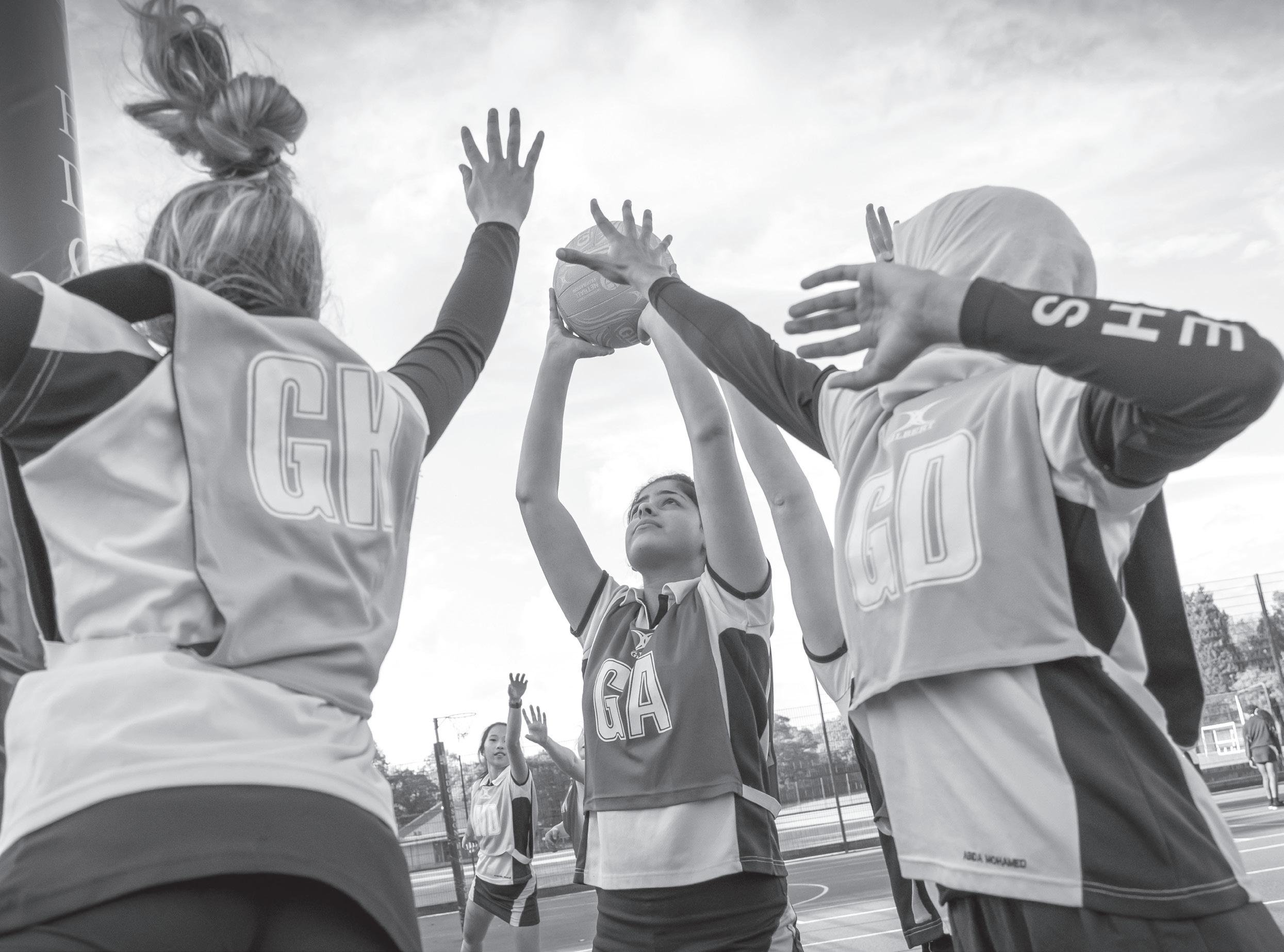
Physics
Examination Board: AQA
AQA Physics provides a seamless transition to A-level from GCSE and to develop interest and enthusiasm in the subject. It aims to introduce new and exciting areas of Physics as well as developing knowledge and understanding of the key principals.
Year 1 Course Content
Measurements and their errors: Students develop a working knowledge of vital units, skills and numerical treatments that underpin the course and their practical work.
Particles and radiation: Extends the students’ knowledge of atoms, nuclei and electromagnetic radiation and then introduces them to the more recent developments and discoveries in the cutting edge field of Particle Physics.
Waves: Gives a deeper understanding of phenomena such as refraction, diffraction and interference of waves.
Mechanics and materials: Students explore forces, energy and momentum in more detail and are introduced to materials technology. They learn to apply their skills and understanding in a range of everyday as well as scientific and engineering contexts.
Electricity: Builds on the understanding of current electricity students developed at GCSE and introduces new concepts such as potential dividers and internal resistance.
Year 2 Course Content
Further mechanics and thermal physics: This section applies the mechanics techniques covered previously and applies them to more complex oscillating systems. Students then look into the fundamental laws of thermodynamics and how we can explain the behaviour of matter as temperature changes.
Fields and their consequences: Students study gravitational, electric and magnetic fields and look at how they are applied in important contexts such as satellite motion, capacitor circuits and electrical generators.

Nuclear physics: Students study unstable nuclei and their behaviour, gaining hands-on practical experience of using radioactive sources and the safety considerations that must be made.
Medical physics: This section gives students an insight into the vital role of Physics in the field of medicine. This includes looking at the Physics of the body as well as its application in diagnostic and treatment techniques. Mechanics – scalars and vectors; moments; motion along a straight line; projectile motion; Newton’s laws of motion; work, energy and power; conservation of energy.
Assessment - AS: Two, 1 hour and 30 minute examinations A-level: Three, 2 hour examinations. All papers consist of long and short written answers as well as some multiple choice questions.
Practical Assessment - Practical work is at the heart of Physics. During the course, girls will learn to use a number of practical techniques and pieces of apparatus. They will then be assessed on these within their examinations. As a part of the course, they will also complete required practicals. The skills they develop will lead to an endorsement which is awarded alongside their A-level grade.
Beyond A-level
A-level Physics provides a sound basis for students considering courses in a wide range of disciplines including Science, Medicine, Engineering and Architecture. A course in Physics is valuable training for almost any career.
Entry Requirements
It is expected that students will have achieved at least Grade 7 in Physics or Combined Science. They should be competent mathematicians, with a Grade 7 or above at GCSE. Additional mathematical lessons will be provided to support any students not taking Mathematics in Year 12.
Politics
Examination Board: Edexcel
Politics is a new A-level that was introduced to Edgbaston High School in September 2021. The qualification has been designed so that it reflects the demands of a truly modern and evolving political environment in the UK and around the world, and Politics students will gain a detailed insight into the political systems, beliefs, and ideologies that are central to understanding the world we live in today. Politics is a fascinating subject for those with enquiring minds and who enjoy the buzz of political debate. The A-level will allow students who already have an active interest in Politics to broaden their understanding and study a subject that has real relevance in today’s society.
The
Edexcel Politics A-Level
This programme comprises three components:
1. Component 1: UK Politics and Core Political Ideas
2. Component 2: UK Government and Non-Core Political Ideas
3. Component 3: Government and Politics of the USA

Students are expected to take an active interest in current affairs and daily news, and to participate in an extra-curricular political activity such as Debating, Model UN, or assisting with Political assemblies and mock elections. Students are also encouraged to extend their understanding of Politics beyond the demands of the A-level syllabus by attending university lectures and workshops on relevant topics and they are encouraged to enter Sixth Form essay competitions run by Oxbridge Colleges.
Entry Requirements:
Students do not need to have studied Politics at GCSE in order to take it at A-level. However, it is an intellectually demanding course and therefore we expect students to have gained a 7 or above in their English Language and Literature GCSEs. Another key requirement is that prospective students possess an active interest in Politics both inside and outside of the classroom. It is an expectation that Politics students keep up to date with current affairs by reading the news daily.

Psychology
Examination Board: AQA
Psychology is a fascinating and popular subject involving the study of the human mind and behaviour. It is a science with cutting-edge research and real world applications to issues in everyday life. Psychology is offered as a two year A-level course.
Paper 1: Introductory Topics in Psychology
• Social influence
• Memory
• Attachment
• Psychopathology
Assessment: Written examination: 2 hours; multiple choice, short answer questions and extended writing (33.3% of A-level)
Paper 2: Psychology in Context
• Approaches in Psychology
• Biopsychology
• Research methods
Assessment: Written examination: 2 hours; multiple choice, short answer questions and extended writing (33.3% of A-level)

Paper 3: Issues and Options in Psychology
• Issues and debates in Psychology, plus: One from: Relationships, gender, cognition and development. One from: Schizophrenia, eating behaviour, stress.
• One from: Aggression, forensic psychology, addiction.
Assessment: Written examination: 2 hours; multiple choice, short answer questions and extended writing (33.3% of A-level)
Where can Psychology lead?
Psychology develops a range of valuable skills, including critical analysis, independent thinking and research. These skills are transferable to undergraduate study in any subject. Psychology is particularly valuable as a preparation for law, journalism, teaching, medicine and other caring professions. Careers in Psychology include Clinical Psychologist, Sports Psychologist and Occupational Psychologist.
Entry Requirements
Students should have a Grade 6 or above at GCSE in Mathematics and in a Science subject.

Religious Studies
Examination Board: Edexcel

The course provides ample opportunity for discussion of the place of religion in the modern world. It would appeal to anyone with historical, linguistic or religious/philosophical interests but also to those keen to relate scientific discoveries to religious theory.
A-level Overview (three papers)
Paper 1
Philosophy of Religion
- Philosophical issues
- Nature & Influence of religious experience
- Problem of evil and suffering
- Language
- Philosophers
- Influences and developments
Paper 2
Religion and Ethics
- Significant concepts in issues and debates
- Utilitarianism, situation ethics and natural moral law
- War & Peace and Sexual Ethics
- Ethical Language
- Ethical Theory (including comparison of 2 scholars)
- Medical ethics
2 hour examination
33.3% of qualification
Entry Requirements
2 hour examination
33.3% of qualification
Paper 3 Study of Religion
- Religious beliefs, values and teachings
- Sources of wisdom and authority
- Practices that shape and express religious identity
- Social and Historical developments
- Comparative study of two scholars
- Religion and Society
33.3% of qualification
2 hour examination
If GCSE Religious Studies has been taken, a Grade 7 is required. A willingness to consider different issues from a number of viewpoints is equally important. For those who have not undertaken a GCSE course, a minimum of a Grade 7 in either English Language or English Literature is essential.
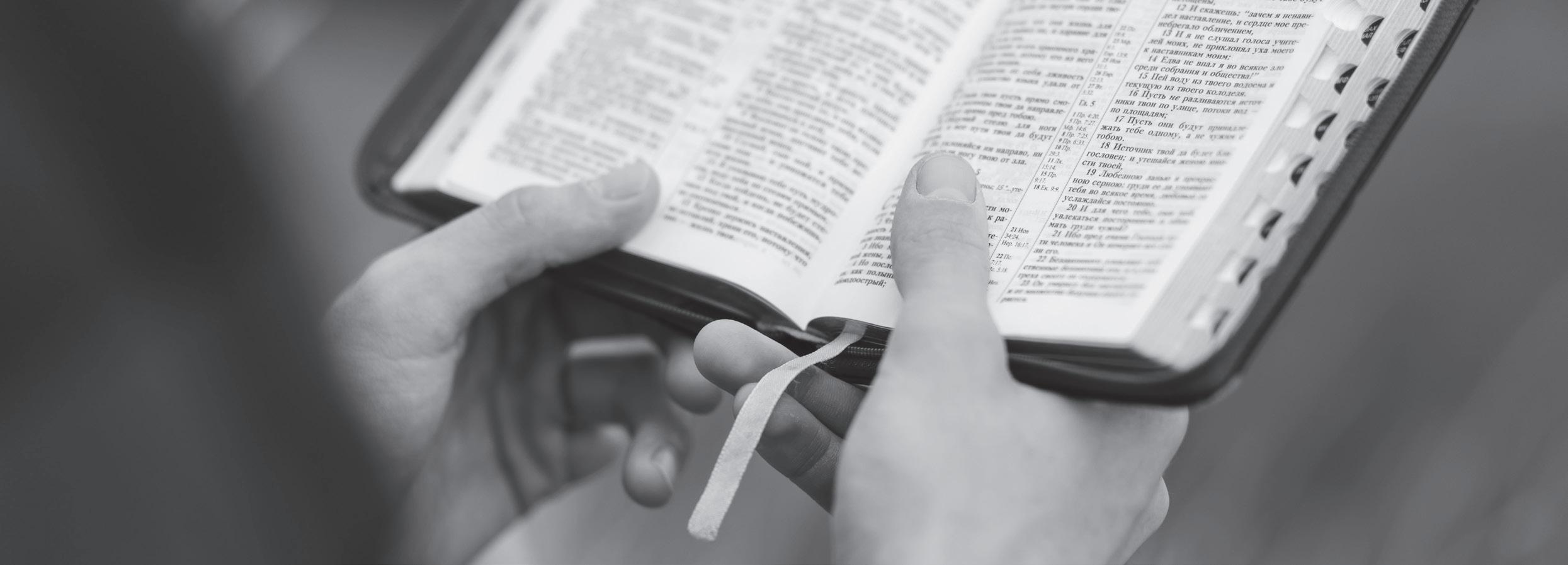
Sociology
Examination Board: AQA
AS Examination (one year course)
Paper 1: Education with Methods in Context
Content: Education, Research Methods in context
Assessment: 1 hour and 30 minute written examination (short answer and essay questions) worth 50% of the mark.
Paper 2: Research Methods and Topics in Sociology
Content: Research Methods, Families and Households
Assessment: 1 hour and 30 minute written examination (short answer and essay questions) worth 50% of the mark.
A-level Examination (two year course)
Unit 1: Education with Research Methods
Content: Education, Methods in context, Sociological Theory and Methods
Assessment: 2 hour written examination (a mixture of short answer and essay questions) worth 33.3% of the mark.
Unit 2: Topics in Sociology
Content: Families and Households, Beliefs in Society
Assessment: 2 hour written examination (essay questions) worth 33.3% of the mark.

Unit 3: Crime and Deviance with Theory and Methods
Content: Crime and Deviance, Sociological Theory and Methods
Assessment: 2 hour written examination (short answer and essay questions) worth 33.3% of the mark.
Where can Sociology lead?
A-level Sociology will develop your critical and research skills, which are valuable for higher education and beyond. It can lead directly to a degree in Sociology, Criminology and the Social Sciences or to degree courses in subjects as diverse as History, Law, Politics and Psychology. Sociology is particularly relevant for anyone considering a career in the caring professions, such as social work, nursing and teaching.
Entry Requirements
Grade 6 or better in English at GCSE is a requirement as students will write essays as part of the course. You should have an interest in social issues and be willing to participate in group discussions.

Careers
Careers Education is an integral part of life at EHS, incorporated throughout the year groups as part of the PSHEE programme and continuing into the Sixth Form. We pride ourselves on the support and impartial careers advice that girls receive throughout their time at the school with careers interviews available throughout the academic year. In the Sixth Form, students have the opportunity to make use of the facilities in the careers room to investigate courses, universities and discuss their future plans. We have dedicated UCAS advisors to further enhance the girls’ prospects of attending the university of their choice, providing structured and personalised guidance through the process of UCAS application.
Tutorials are an essential forum for talks alongside valuable tutor time. We have a range of external speakers who provide insights on gap years and alternative routes into the workplace. Recently, Sixth Form students benefitted from guest speakers representing airlines, law firms, apprenticeships, the Army, gap year placements, studying abroad and individual universities, to name a few. Speakers from a variety of sources will continue to be available to Sixth Form students over the course of the next academic year to help them make their future choices with confidence. We have a programme of careers-themed assemblies in order to allow the girls to find out about a huge range of opportunities available to them. There are sessions on financial capability and work-related learning.
Girls from past years are encouraged to visit the school and give an ‘insiders’ account of what to expect from university or a particular job role and to offer any advice
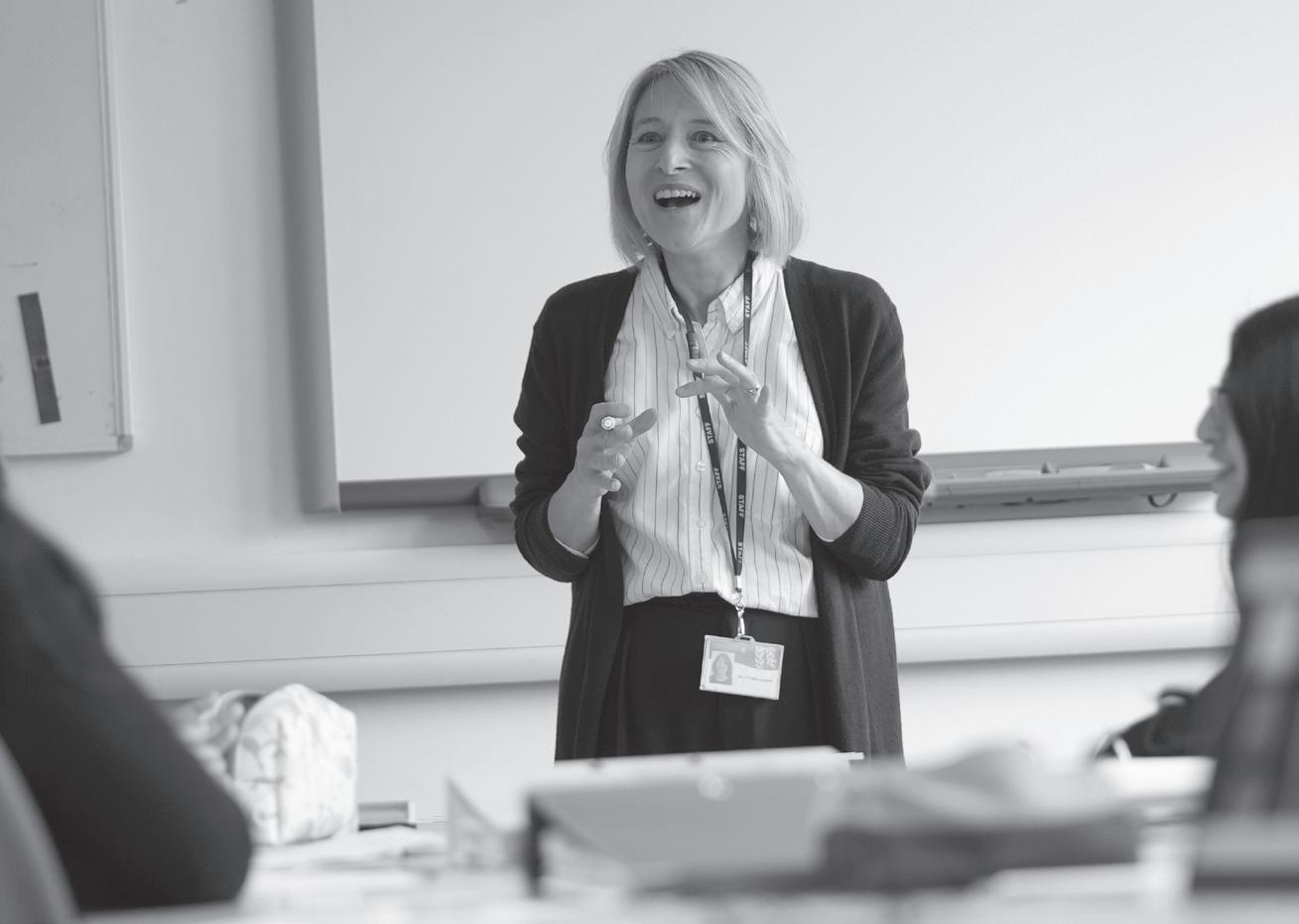
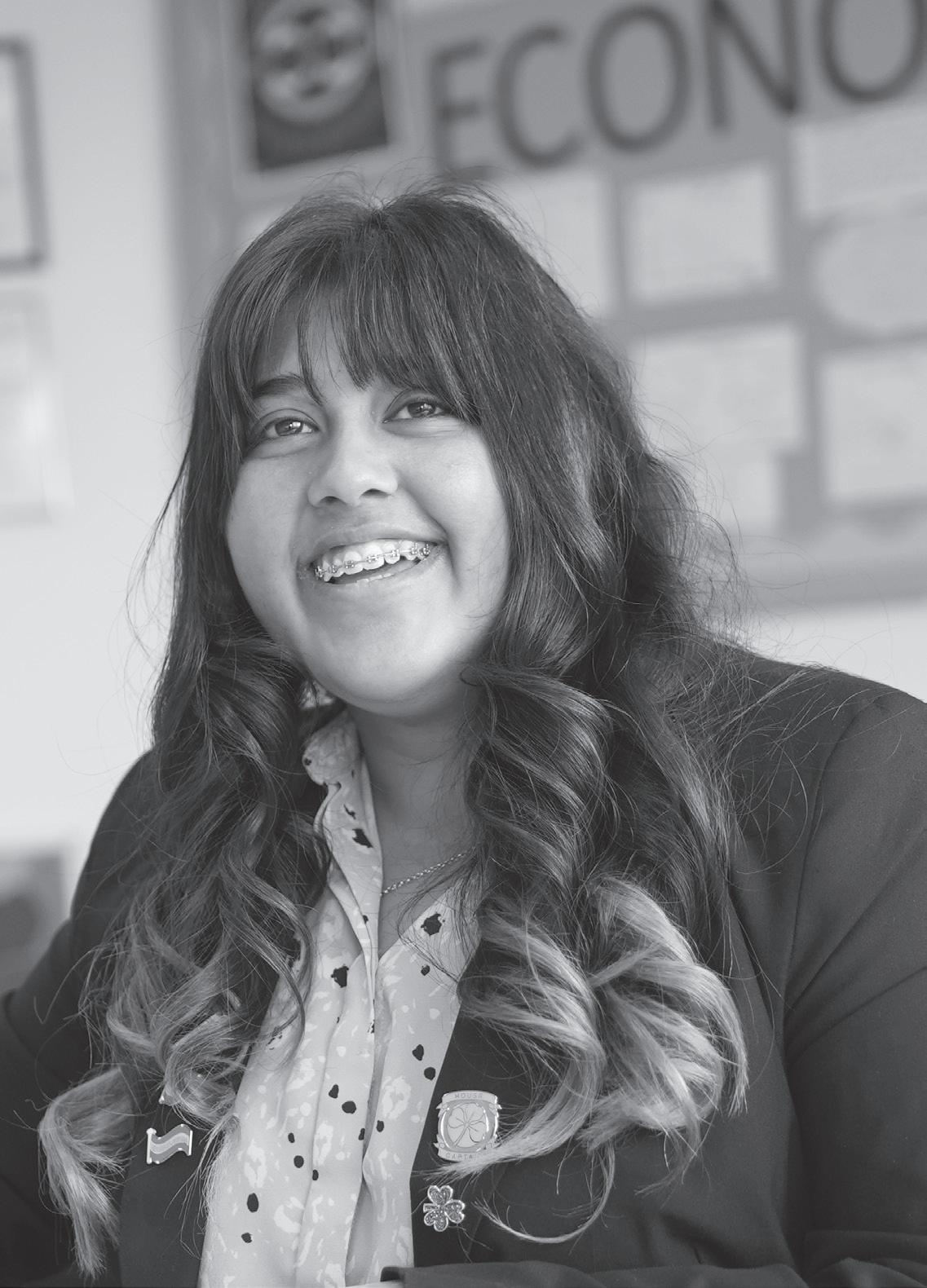

they can. From the contacts that EHS have, we can provide girls with a mentor in their chosen field in order to help with work experience placements and/or university applications.
Work Experience
Work experience is encouraged as it shows a valuable insight into the world of work that cannot be replicated within the school environment. This is to allow them to experience the world outside of school and give them a chance to make a valuable addition to their personal statement for university/employment applications.
The girls have arranged a variety of placements within the BBC, law firms, barrister chambers, hospitals, surgery and dental practices, accountancy firms and many others. Each year we have some excellent reports back from employers, many of which are willing to take placements year-on-year. We have, and are, continuing to build up a portfolio of employers willing to take our girls for placements. We hope this will continue to flourish and extend further now that we have a database of information that will be available to all students.
Destination of Leavers 2024

